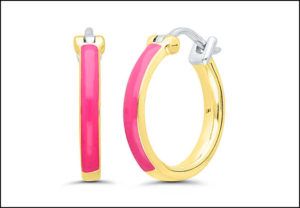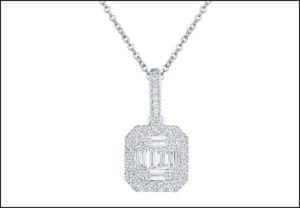Lean on Me
During a time when there are supply chain challenges that are forecasted to continue through at least spring of 2022, vendor-retailer partnerships are more important than ever.
Valerie Fletcher, vice president of design and product development for Original Design Inc. (ODI), advocates jewelers prepare for Christmas, while also looking ahead to Valentines and Mother’s Days.
“Jewelry is expected to have a strong winter holiday season, and will continue to be strong throughout 2022,” says Fletcher. She suggests that retailers nervous about getting stuck with excess inventory, discuss extended terms or enhanced return privileges with their vendors.
Keeping dialogue open between retailer and supplier is critical to forecast supply, underscores Mathew Behnam, vice president of sales and marketing for the designer brand Samuel B.
In a brief released in June by Bain & Co. called, “Growth for Both: How US Brands and Retailers Grow the Profit Pool for All,” the management consulting firm advocates manufacturers and retailers can improve joint business planning to help each other thrive amid mounting challenges in a post-pandemic world.
The brief cites that during much of the pandemic, consumer goods companies and retailers in the U.S. were collaborating out of necessity to ensure the supply of essentials. While the report focuses on the grocery industry, the message translates throughout industries, in that a collaborative approach helps suppliers and retailers overcome multiple challenges.
Redesigning Partner Experience
A recent Deloitte Insights article, “Redesigning partner experience in Industry 4.0,” presents how a well-defined partner strategy and engagement model can help drive enhanced customer experience and outcomes. As end-to-end digital industrial solutions grow more complex, companies need to leverage the partner ecosystem across the value chain.
To cultivate this ecosystem evolution, Deloitte advocates vendors look to establish and support an integrated and comprehensive partner community that both creates and captures value in the market. To achieve this, they must understand what the partners expect and the biggest pain-points with their recent engagement experience.
The 2112 Group’s 2019 ease of doing business report found that nearly three-quarters of partners complained about overly complicated partner programs and said they look for increased support, transparency, and predictability in programs. Close to 40% wish for consistent rules of engagement, improved training programs, and simplified incentive management. Fully 61% of partners feel that they have insufficient strategic guidance and would like more transparent market development fund requirements, while 70% of partners feel that the on-boarding processes have too many steps and could be streamlined.
Behnam found that time invested in fielding thousands of phone calls when he first joined the company in 2015 told him what retailers needed from suppliers to better manage merchandise and market product.
“It allowed me to pinpoint what was lacking that retailers wanted from their suppliers. I heard their frustrations. As suppliers, we’re supposed to make it as easy as possible to order and sell our products.” Among the things Behnam implemented long before the pandemic hit was automating the company and custom building a wholesale website.
He’s also bullish on stock balancing and thinks jewelers do not use the opportunity enough, because most programs that exist make it a chore to swap product. While Samuel B. gives incentive to do so, offering a one-for-one stock balance program, with no RA# or minimum shelf-time required.
“Our stock balance rate is less than 10%, and it should be higher than that,” he says. “The goal is to have the best product assortment possible. If someone is doing well will 50% of their merchandise turning, they may be happy enough, and not realize that 20% to 30% is stale, and if they got rid of it, and expanded in areas that have been successful, they’d sell more.”
To be more proactive, Samuel B. has partnered with the merchandising consultant, Buyers Intelligence Group (BIG), to help its retail jewelers identify, through data analysis, opportunities to increase profitability through better stock oversight and merchandising.
Samuel B. was one of several companies exhibiting in The Plumb Club Pavilion at JCK Las Vegas late August touting custom-designed, user-friendly displays with small footprints of their bestselling products and fastest-turning collections. For Samuel B. that is its birthstone collection. For Imperial, it is the pearl house’s signature Akoya collection.
Other effective sales tools and vendor benefits popular among retailers visiting TPC pavilion, include Shah Luxury’s virtual try-on application and Storybook Card that tells the journey of piece via QR code; Quality Gold’s six-month deferred payment plan; IDD’s IDDeal Consumer Credit Card Program; and Ostbye’s wildly popular Holiday Wishbook for jewelers and free custom designs platform online.
Sales training also is key to helping retailers sell more product underscores Sarah Cuidon for the pearl house Mastoloni Particularly for a category like cultured pearls, where grading standards vary, teaching jewelers what to look for like luster, blemishes, etc. is imperative. She says that as a B2B company, it has been focusing on retailer training and the narrative around pearls.
Harry Fiorentinos, director of sales for Novell, concurs, noting that the brand launched this year a full online resource center for its retail partners, called Novell University. It features educational podcasts, jewelry blog, video, and podcast interviews with industry leaders, artists, and designers.
“NovellUniversity.com is designed with our mission of educating jewelry retailers on Novell products and business practices while using the power of social media to drive traffic to their brick and mortar and online store,” Fiorentinos describes.
It Takes a Village
As a group, The Plumb Club has expanded its outreach and communications to provide an immersive online sales meeting platform for business connections to happen called TPC365, a virtual showroom and resource for brand assets.
At JCK this year The Plumb Club unveiled the final-phase of the project, expanding its footprint as a member resource center, a one-stop shop for the organization’s webinars, podcasts, news articles, and other content to share.
“We want to build this hub as a resource center that can help retail jewelers on the front lines on a variety of topics,” advocates Lawrence Hess, executive director of The Plumb Club.
Not only can jewelers on site browse, shop, and discover new things from this curated group of suppliers, they also have access to other organizations and service companies with tools and resources in a robust marketplace.



